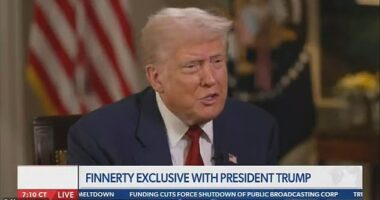The S&P 500 was down 5 per cent in midday trading (2am today AEST), slicing into Wednesday’s surge of 9.5 per cent following Trump’s decision to pause many of his tariffs worldwide. The Dow Jones Industrial Average was down 1724 points, or 4.2 per cent, and the Nasdaq composite was 5.7 per cent lower.

“Trump blinks,” UBS strategist Bhanu Baweja wrote in a report about the president’s decision on tariffs, “but the damage isn’t all undone.”
He upped his tariffs on Chinese goods to 145 per cent after China placed retaliatory taxes of 84 per cent on imports from the US. While his 90-day pause on other tariffs caused the stock market to rally yesterday, countries still face a baseline 10 per cent import tax instead of the higher rates announced on April 2.
“There will be a transition cost and transition problems,” Trump said at yesterday’s (early this morning AEST) cabinet meeting.
“But in the end it’s going to be a beautiful thing.”
Kevin Hassett, director of the White House National Economic Council, told Fox News’ Fox and Friends on Wednesday that the administration already has “offers on the table from more than 15 countries.”
Trump has focused more on China, raising tariffs on its products to well above 100 per cent. Even if that were to get negotiated down to something like 50 per cent, and even if only 10 per cent tariffs remained on other countries, Baweja said the hit to the US economy could still be large enough to hurt expected growth for upcoming US corporate profits.

Asked at the cabinet meeting what was next for Beijing, Trump said he would “love to do a deal”.
“They’ve really taken advantage of our country for a long period of time,” he said.
“They’ve ripped us off beyond anybody. Nobody. How people stood for it, sitting in my position is not even believable.
“And we’re talking about many presidents, not just a couple, but they did, and all we’re doing is putting it back in shape. We’re resetting the table, and I’m sure that we’ll be able to get along very well.”

The overnight drop for the S&P 500 reached 6.3 per cent at one point.
“Everything is still very volatile, because with Donald Trump, you don’t know what to expect,” said Francis Lun, chief executive of Geo Securities.
“This is really big uncertainty in the market. The threat of recession has not faded.”
China, meanwhile, has reached out to other countries around the world in apparent hopes of forming a united front against Trump.
The stock price of Warner Brothers Discovery, the company behind A Minecraft Movie, dropped 14 per cent for one of Wall Street’s sharpest losses after China said onThursday it would “appropriately reduce the number of imported US films.” The Walt Disney Co.’s stock sank 8 per cent.

A spokesperson for the China Film Administration said it is “inevitable” that Chinese audiences would find American films less palatable given the “wrong move by the US to wantonly implement tariffs on China”.
That was after Trump and his Treasury secretary, Scott Bessent, sent a clear message to other countries on Wednesday after announcing their tariff pause: “Do not retaliate, and you will be rewarded.”
The European Union said yesterday it would put its trade retaliation measures on hold for 90 days and leave room for a negotiated solution.
It all demonstrates why many on Wall Street are preparing for more swings to hit markets, after the S&P 500 at one point nearly dropped into a “bear market” by almost closing 20 per cent below its record. Often, the whipsaw moves have come not just day to day but also hour to hour. The S&P 500 still remains below where it was when Trump announced his sweeping set of tariffs last week on “Liberation Day”.

Panic on Wall Street as Trump announces new tariffs
One encouraging signal had been coming from the bond market, where stress had seemed to be easing.
With $US28.9 trillion ($46.5 trillion) in publicly held debt, the US government can still be beholden to the investors who lend it money.
Trump might be willing to run roughshod over political rivals, judges he dislikes and a host of political norms, but the bond market showed that it can temper his plans.
The bond market has historically played the role of enforcer against politicians and economic policies it deemed imprudent. It helped topple the United Kingdom’s Liz Truss in 2022, for example, whose 49 days made her Britain’s shortest-serving prime minister.
James Carville, adviser to former US president Bill Clinton, famously said he’d like to be reincarnated as the bond market because of how much power it wields.
Earlier this week, big jumps for US Treasury yields had rattled the market, so much that Trump said Wednesday he had been watching how investors were “getting a little queasy”.







